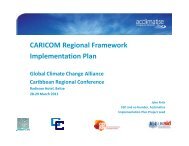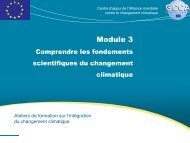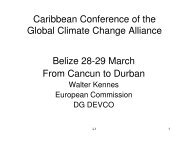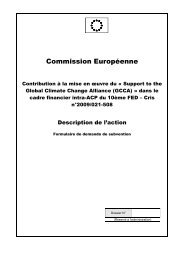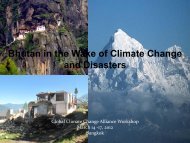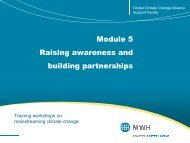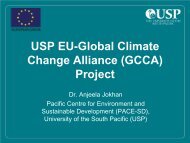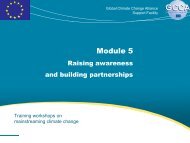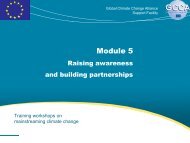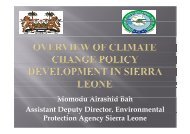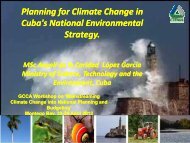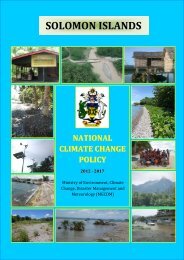Rwanda Green Growth Strategy 18nov11 - Global Climate Change ...
Rwanda Green Growth Strategy 18nov11 - Global Climate Change ...
Rwanda Green Growth Strategy 18nov11 - Global Climate Change ...
You also want an ePaper? Increase the reach of your titles
YUMPU automatically turns print PDFs into web optimized ePapers that Google loves.
Chapter 6To deal with unavoidable macroeconomic consequences of implementing the <strong>Strategy</strong>, and ensuretime consistency between the implementation of the <strong>Strategy</strong> and other macroeconomic objectives, thegovernment will need to design a phased implementation plan divided into short-, medium-, and long-termactions. Such a plan will be essential in view of the time needed to build capacity (administrative, technicaland logistical), as well as the inevitable challenges of the timing of procurement of external financialresources and essential inputs. For a rough idea of the phased implementation plan, a “timescale toinitiation” for each action is included in the programme descriptions.Chapter 6: Roadmap to ImplementationThe cost-benefit analysis must be done across all sectors, with oversight by the Ministry of Financeand Economic Planning (MINECOFIN).Future ScenariosAll decisions and plans ‘live’ in the future. Indeed, success in the future relies not on the study of thefuture but on the success of decisions taken today. The uncertainty of climate change impacts, over thelong term, limits the effectiveness of conventional approaches to planning, i.e. forecast-based planning.Forecasting assumes that the future can be predicted, based on a continuation of past and present trends.Forecasting adopts a trend by trend approach and, as such, cannot provide a systemic understanding ofthe future. Alternative approaches to decision-making under uncertainty that have developed to address thelimitations of forecasting in the face of inherent uncertainties include scenarios and visioning. Visioninginvolves a discursive-analytical and social process that aims to forge a shared sense of the preferred futurefor a group, organisation or nation. Combined with a backcasting methodology, i.e. working from the futureback to the present, the means to achieve progress towards the vision is made concrete through thearticulation of a pathway and key milestones.Scenarios similarly comprise a discursive-analytical and social process but, in contrast to visioning,explore multiple, plausible futures rather than the single, preferred future. Scenarios, in essence, explorewhere the future might take us. A set of scenarios describes two or more stories of the future context of agroup, organisation or nation. Scenarios are purposeful interventions, providing the means to an end, ratherthan the end, in the form of a set of scenarios (a product/booklet) that are used to achieve some widerpurpose (e.g. risk assessment and crisis management, strategic planning, community alignment). Scenariosexplore what is beyond the control and direct influence of an organisation. Scenarios provide a method forengaging with uncertainties that manifest in the interplay of macro/exogenous trends. It is important to notethat scenarios focus on the context, not the self.Scenarios have been used for over 50 years to help groups, organisations and nations to think theunthinkable, by revealing and testing deeply-held assumptions about the future that frame today’s issues.Scenarios are not strategy or policy but provide a set of wider conditions that can be used to develop and/or test options. Combining scenarios with visioning provides a robust and more systemic approach todecision-making under uncertainty that is suited to the evidence-based and positivist thrust ofgovernmental policy making and planning. Scenarios and visioning can help organisations avoid the trapsof prediction which underpins forecast-based planning and be used to develop early warning systemssuited to navigating unpredictable and turbulent changes. With the uncertainties surrounding climatechange, as well as the number of regional and global actors and events which will impact the future of<strong>Rwanda</strong>, the use of scenarios to test and refine the national green growth strategy can help further developthe vision of a thriving nation and inform or test the robustness of the plan. Using a ‘what if’ approach,scenario planning can help identify options for flexibility that will be needed if <strong>Rwanda</strong> is to be prepared forthe variances and challenges presented by climate change.National <strong>Strategy</strong> on <strong>Climate</strong> <strong>Change</strong> and Low Carbon Development 47



